RMD Rules for Inherited IRAs
June 28, 2021 by Robin Scott-Hutchens, EA
What is an “RMD,” first of all? No, it’s not that new wave band you remember from the ‘80s! An RMD is a required minimum distribution from a retirement account such as a Traditional IRA or defined contribution plan (like a 401k). Once the retirement account owner reaches a certain age, the IRS wants to see that person start drawing down the money they’ve saved. That “certain age” can be 70 ½ or 72, depending on when you reach that age. Folks who reach the age 70 ½ by the end of 2019 (that means you were born on June 30, 1949, or earlier) are required to take their required minimum distributions by April 1 of the year after they reach 70 ½. Now, for folks who aren’t quite there yet, meaning you were not 70 ½ by the end of 2019, you can wait till you are the ripe age of 72. The same April 1 deadline applies. You must start taking your RMD by April 1 of the year, following the year you turn 72.
For those who have reached their required age, taking a minimum distribution each year is generally required (hence the name) by the IRS. If you do not take your RMD in a particular year or only take a portion of it, this can carry a pretty hefty tax penalty of 50% on the amount not taken. It is essential to point out here that in 2020, RMDs were waived under the CARES Act but only for 2020. (I mean, who doesn’t love a complicated word problem when trying to figure out retirement requirements? Train A leaves Boston, and Train B leaves Seattle…I digress.)
Now, let’s say you are not the account owner but rather the beneficiary of that person’s individual retirement account (IRA). What should you expect?
As the beneficiary of an IRA, you want to first determine if the decedent had reached the age where distributions were mandatory. If distributions were required, did the decedent already take their RMD in the year of their passing? If they had already taken it from their IRA, you don’t need to worry about any additional RMDs from that account for that year. You will need to consider what to do with the remainder of the money in the IRA, and we’ll get into that in just a moment.
If the decedent did not take their annual RMD before the date of their passing, then you, as the beneficiary, will need to take that RMD. This will ultimately be reported to you on a Form 1099-R under your social security number, and some or all of this will be treated as taxable income on your tax return. So, you may be expected to pay income tax on the distribution, but you will not be subject to the additional 10% early distribution penalty, even if you have not reached age 59 ½ yet.
Then what? What about the remainder of the funds in that IRA you just inherited? If the decedent passed away after December 31, 2019, generally, a beneficiary must take all funds from the account by the end of the 10th year following the year of the account owner’s death. Funds can be taken all at once in that ten years, or multiple distributions can be made. So long as all the funds are distributed from the account by the end of that ten years, you’ll be following the rules set forth under the SECURE Act. Keep in mind that taking the money out of the account counts as a retirement distribution and can be subject to income tax. You will again receive a Form 1099-R for each year you take money out of the IRA, and this should be reported on your tax return. If you are dealing with a sizeable IRA, you may also be dealing with a sizeable tax bill too, especially if the distribution kicks you into a higher tax bracket.
There are some exceptions to the 10-year rule for folks considered “eligible designated beneficiaries.” We won’t get into the exceptions here, but it is important to keep this in mind if you are one of these folks. How do you know if you are one of these? If you are the IRA owner’s spouse, a minor child, disabled, chronically ill, or someone who is not more than ten years younger than the IRA owner, you are an eligible designated beneficiary.
Rules for required minimum distributions on inherited retirement accounts and what to do with the money afterward can be tricky. If possible, seek the advice of a tax professional to help you understand your options and the implications of each before making a decision on what to do with the money.





